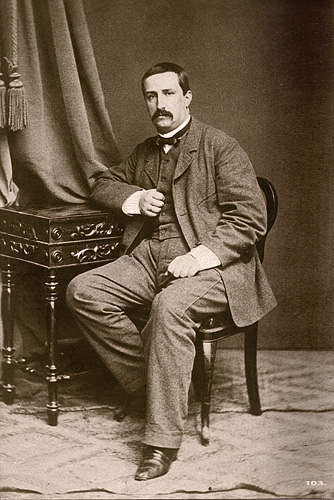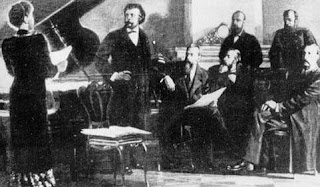 |
| Alexander Borodin (1833-1887) |
Alexander Borodin was a Russian composer and chemist. Those two seem to be very divergent, and in reading about him, it is interesting that I can find very little about if the two fields interacted in any practical way. In fact, his science appears to have gotten in the way of his composing. I had never heard of him, or at least thought I hadn't. It turns out I have heard some of his music. Here is an example, the Polovtsian Dances from the opera Prince Igor. I would suggest starting this and listening while continuing to read, though the ballet is quite good too.
Borodin was the illegitimate son of a Georgian prince, but he was born in Saint Petersburg and registered as the son of a serf. The prince did not forget him, though, and he was able to receive a good education. He was interested in both science and music, and wrote his first existing composition, a polka, at the age of 9. He attended the Medico-Surgical Military Academy in Saint Petersburg and started out as a doctor, though he became very interested in chemistry and studied with the chemist Nikolay Zinin, who apparently was a Russian chemist of note. Despite being at a medical school, Borodin was squeamish and therefore not well suited to being a doctor, so he continued his chemistry studies. Zinin is said (probably apocryphally) to have told him
Mr. Borodin, it would be better if you gave less thought to writing songs. I have placed all my hopes in you, and want you to be my successor one day. You waste too much time thinking about music. A man cannot serve two masters." (Podlech, from another source)Borodin did not give up "writing songs", but still managed to become Zinin's successor. After graduating in 1858, he traveled Europe for three years. He started in Heidelberg, working first with Robert Bunsen, though he ended up staying longer with Emil Erlenmeyer (and I've already written about them!). There he became friends with Dmitri Mendeleev (of the periodic table) and his future wife, the pianist Yekaterina Protopopova. He also attended the Karlsruhe Congress in 1860, an important milestone in understanding and standardizing atomic weights. He went with Yekaterina to Pisa and asked to work in the laboratory of de Luca and Tassinari (whom I had never heard of ). They had platinum retorts, which enabled him to work with corrosive substances. There he was able to make the first nucleophilic replacement of a halogen with fluorine, which was difficult because of the strength of fluorine bonds and fluorine's toxicity.
 |
| The Five. From left to right: singer, Mussorgsky, Rimsky-Korsakov, Vladimir Stasov, Balakirev, Cui, and Borodin |
Borodin continued his research and composing. One of the interesting things that happened in the next decade was a sort of dispute with August Kekulé. Borodin had been studying aldehydes, but Kekulé began research into their condensation in the late 1860s. It seems rather confusing who did what, but Borodin seemed to think that Kekulé was impinging on his territory. However, Borodin wasn't publishing much, so it was hard to actually make a claim. Eventually, Borodin ceded and returned to his work on amides. One of his most significant contributions in this field was a simple device to measure the amount of urea in animal urine. I have no idea why people wanted to use that, but contemporaries seemed pretty excited. After 1875, he did not publish any full papers. Instead, he spent more time on training students and advocating for women's rights. He gave lectures and provided special instruction for the female students studying medicine.
One wonders how Borodin juggled composing with science, and I found a great quote that expresses his difficulties.
In winter I can only write music when I am so ill that I don't give lectures, don't go to the laboratory, yet all the same can work a little. For this reason my musical friends, contrary to universal custom, always wish me not health, but sickness. (Letter to Liubov' Ivanova Karmalina, June 1, 1876)Though his total oeuvre is small, the quality of his work is generally acknowledged to be good. He wrote two symphonies, some chamber music compositions, songs, and much of an opera. He worked on Prince Igor from 1869 until his death in 1887. Rimsky-Korsakov was concerned about it getting finished, and offered to help with it as much as he could. In the end, though, Rimsky-Korsakov and Alexander Glazunov had to finish it after Borodin's death, which unfortunately occurred at a fancy dress party.
References
- Michael D. Gordin, "The Weekday Chemist: The Training of Aleksandr Borodin", in A Master of Science History, ed. Jed Z. Buchwald (New York: Springer, 2012), 137-166.
- Joachim Podlech, "'Try and Fall Sick...'--The Composer, Chemist, and Surgeon Aleksandr Borodin", Angewandte Chemie International Edition 49, 37 (2010), 6490-6495. DOI 10.1002/anie.201002023
- Michale D. Gordin, "Facing the Music: How Original Was Borodin's Chemistry?", Journal of Chemical Education 83, 4 (April 2006), 561-565. DOI 10.1021/ed083p561
- Leopold May, "The Lesser Known Chemist-Composers, Past and Present", Bulletin for the History of Chemistry 33, 1 (2008), 35-43.
Oh my gosh, I had no idea that Borodin was also a chemist (good call, Melissa)! This is so interesting.
ReplyDeleteYou also probably know another one of Borodin's pieces, his string quartet in D Major. It's the background music to Disney/Pixar's Little Match Girl.
http://www.youtube.com/watch?v=yUSzQBaWq0Q